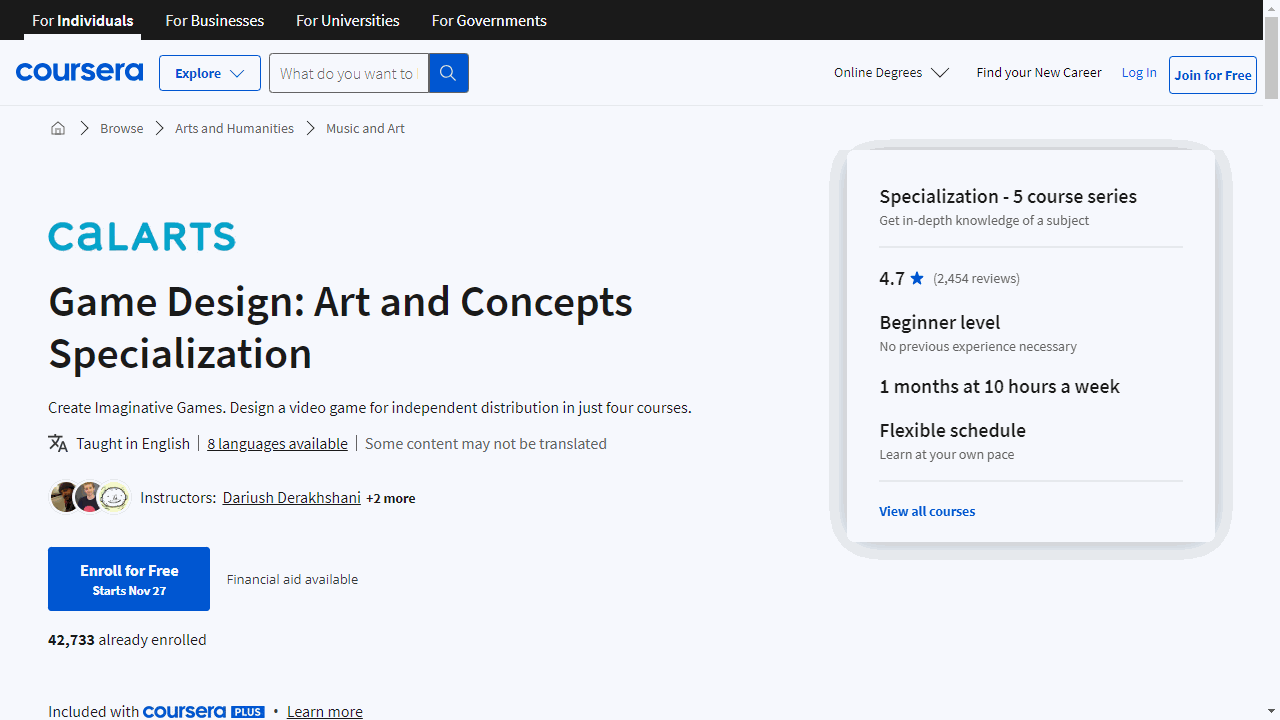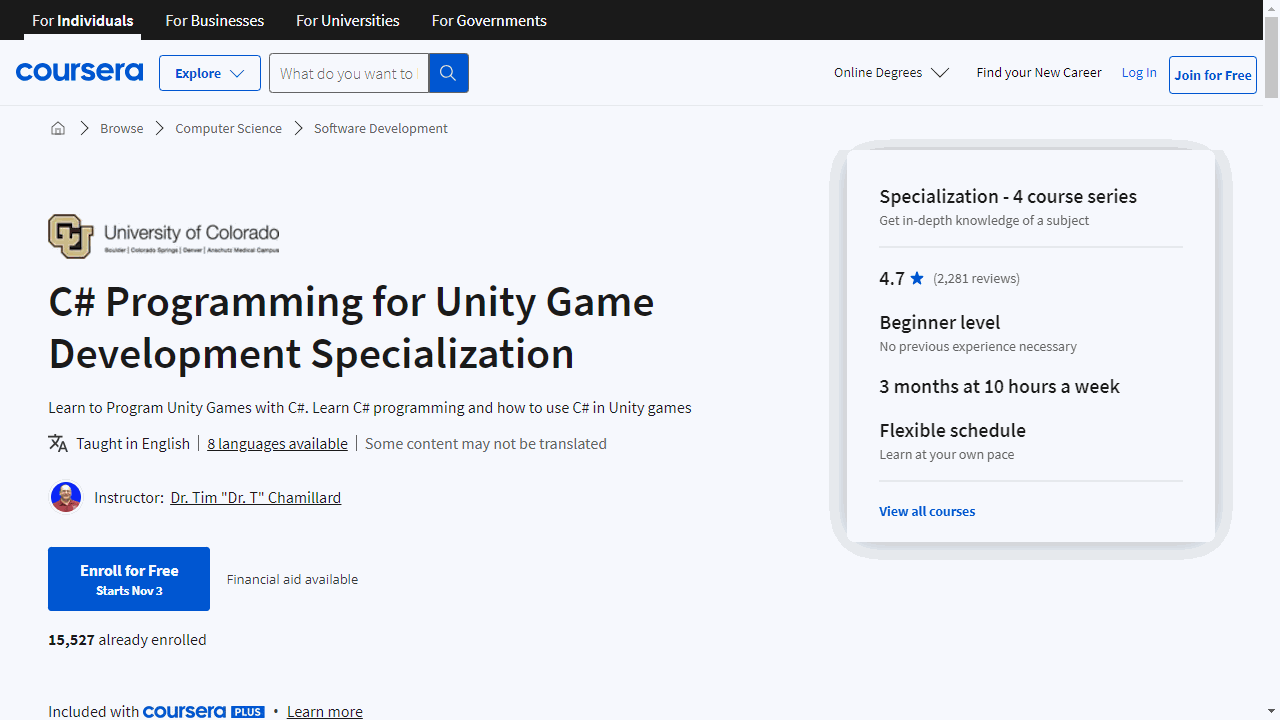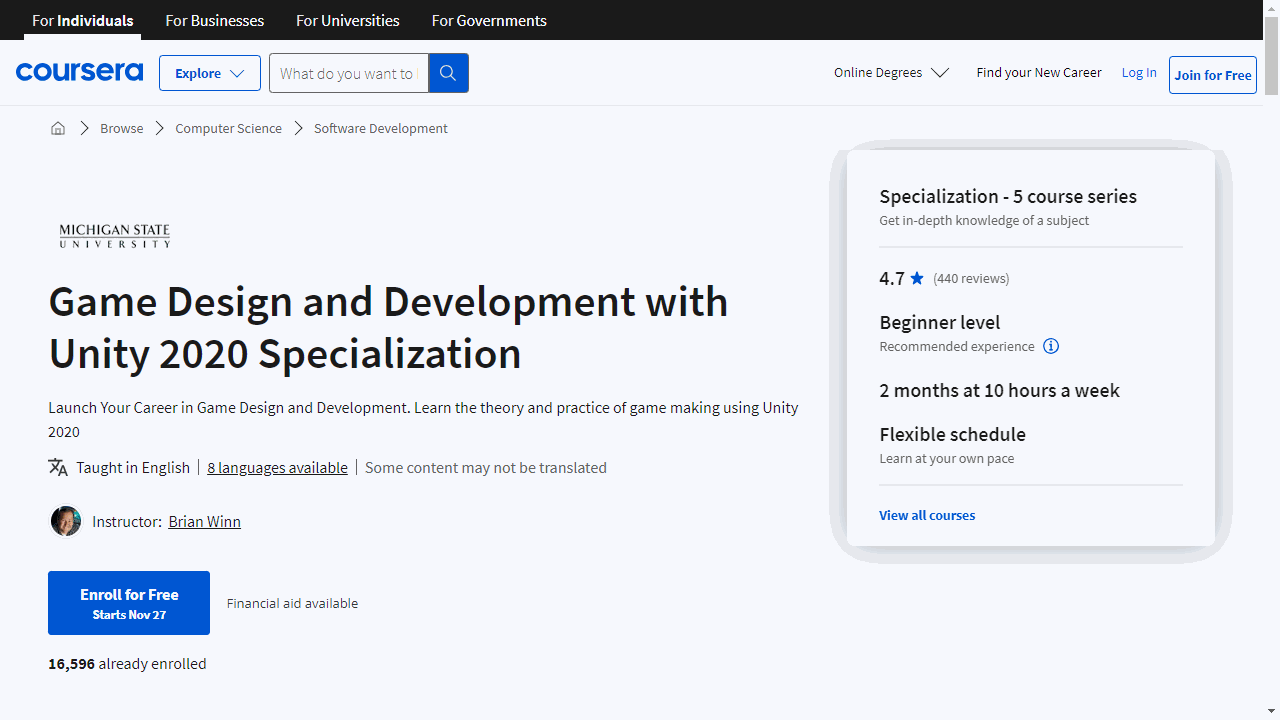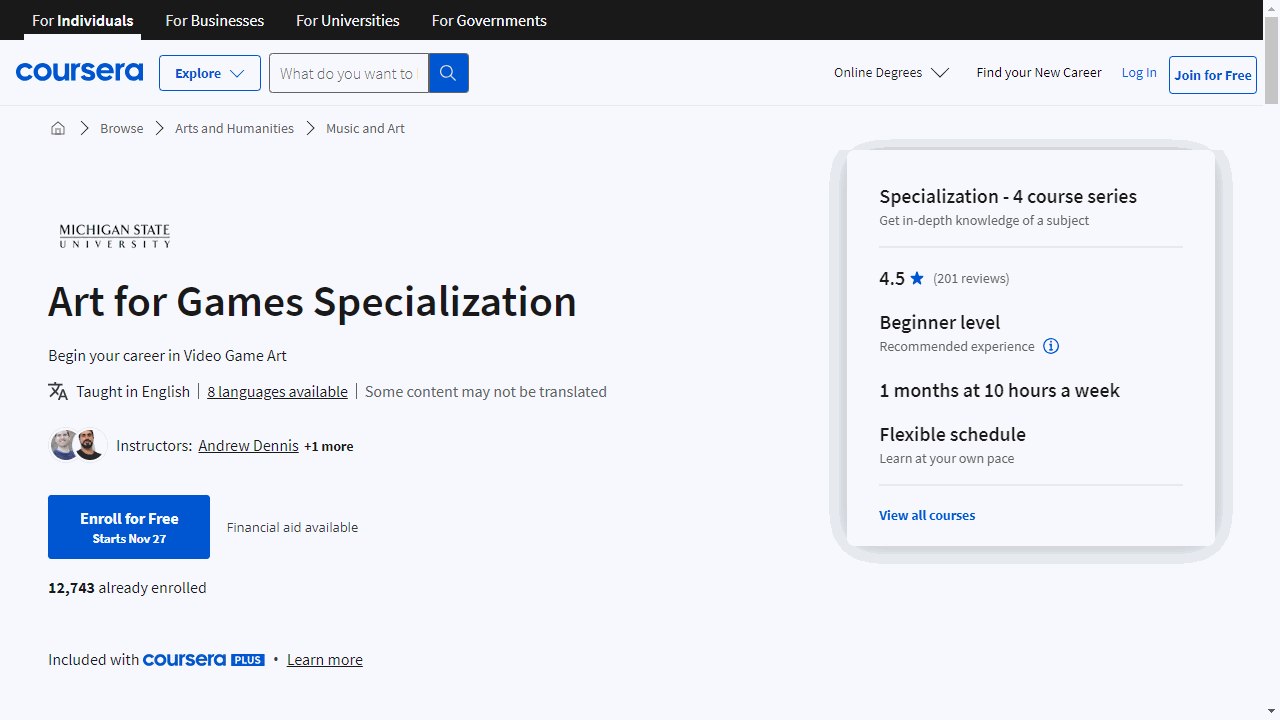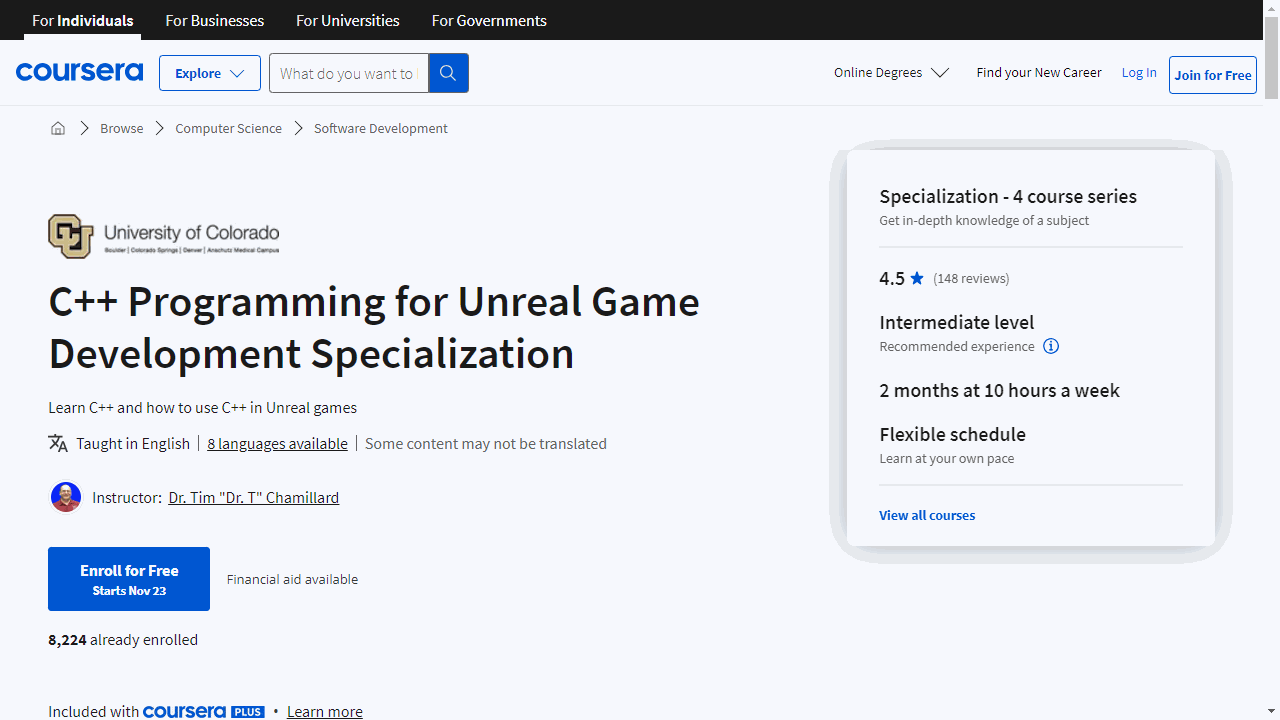Game development is a fascinating field that combines creativity, technical skill, and storytelling.
Whether you’re a seasoned programmer or a complete beginner, learning game development opens doors to a world of possibilities.
You can create interactive experiences, bring your ideas to life, and even build a career in this exciting industry.
But finding the right game development course can be overwhelming.
With so many options out there, it’s hard to know where to start.
You’re looking for a course that’s comprehensive, engaging, and taught by experienced instructors.
You want something that covers the fundamentals, but also dives into the latest industry trends.
For the best game development course overall, we highly recommend the Game Design: Art and Concepts Specialization on Coursera.
This specialization is a curated collection of courses that dives deep into the creative and conceptual aspects of game design.
It’s taught by experienced industry professionals and covers a wide range of topics, including game mechanics, story development, world building, and character design.
It provides a solid foundation in game design principles and will equip you with the skills to create engaging and memorable games.
While this is our top pick, there are plenty of other great courses available.
Keep reading to discover other recommendations for beginners, intermediate learners, and those who want to specialize in specific areas of game development.
Game Design: Art and Concepts Specialization
This specialization is a well-structured journey through the core aspects of game design, tailored for both beginners and those looking to sharpen their skills.
The specialization kicks off with “Introduction to Game Design,” where you’ll dissect what makes a game engaging.
This course lays the foundation, focusing on game mechanics and concept development without requiring any coding experience.
It’s all about the underlying principles that make games fun and memorable.
Moving on to “Story and Narrative Development for Video Games,” you’ll delve into the art of storytelling.
Here, the emphasis is on narrative structures and their role in driving gameplay.
You’ll learn to craft stories that aren’t just background noise but are integral to the gaming experience.
In “World Design for Video Games,” the spotlight is on creating immersive environments.
You’ll analyze successful game worlds and apply those insights to your designs.
The course equips you with strategies to make your worlds feel alive, whether they’re grounded in reality or fantasy.
“Character Design for Video Games” offers a peek into the studios of industry professionals.
You’ll gain practical insights into character creation, covering everything from movement and expression to overcoming technical constraints.
This course is a gem for anyone interested in bringing memorable characters to life.
The capstone, “Game Design Document: Define the Art & Concepts,” is where your newfound knowledge coalesces.
It’s your opportunity to develop a comprehensive game design document, detailing your game’s vision and mechanics.
Note that this final step is exclusive to those who’ve completed the preceding courses.
C# Programming for Unity Game Development Specialization
This specialization is made up of 4 courses that will take you from no prior coding knowledge to building your own Unity games with C# by the end.
The first course starts with writing your very first lines of code in C# and builds up core programming concepts like variables, classes, loops, and more. You’ll get hands-on experience applying these concepts by building simple console games.
In the second course, you’ll dive deeper into C# and Unity.
You’ll learn how to get user input, use loops for repetition, and work with data structures like arrays and lists. By the end, you’ll expand on a Unity game you built in course 1.
The third course focuses on code abstraction and object-oriented principles.
You’ll learn how to organize code into classes and methods for reusability. This will prepare you to build Unity classes for your games. You’ll also add text, scores, and sound effects to make your games come alive!
The final course takes your skills to an intermediate level.
You’ll implement robust game features like file input/output, inheritance, and event handling. By the end, you’ll build a complete small Unity game yourself!
Game Design and Development with Unity 2020 Specialization
This comprehensive program kicks off with “Game Design and Development 1: 2D Shooter,” where you’ll get hands-on with Unity, the industry-standard engine, and complete two projects, including a 2D Shooter game.
It’s a practical introduction to the world of game making.
Progressing to “Game Design and Development 2: 2D Platformer,” you’ll delve deeper into game design principles, physics, storytelling, and user experience, culminating in the creation of your own 2D Platformer.
This course builds on your foundational skills, enhancing your ability to craft engaging gameplay.
With “Game Design and Development 3: 3D Shooter,” the third course, you transition into the realm of 3D.
Here, you’ll tackle level design, game balancing, and asset creation, essential skills for any game developer.
By the end, a 3D First-Person Shooter game will be part of your growing portfolio.
The fourth course, “Game Design and Development 4: 3D Platformer,” broadens your scope to include idea generation and the business aspects of game development.
Completing this course means adding a sophisticated 3D Platformer to your suite of work.
The capstone, “Game Design and Development 5: Capstone Project,” is where your learning culminates in the production of an original game.
This final project is bolstered by insights from industry giants, offering a real-world perspective on game development.
Art for Games Specialization
“Pixel Art for Video Games” is the first course in this specialization, where you’ll grasp the essentials of pixel art, from shape language to color theory.
You’ll progress from crafting simple props to animating characters, culminating in a project where you create a pixel art asset pack.
This course is perfect for beginners and offers a practical approach to art creation for games.
Moving into the third dimension, “Low Poly Art For Video Games” teaches you to create stylish 3D art with a focus on low poly techniques.
The course guides you through a workflow that’s essential for building your own game assets, equipping you with the skills to produce an original asset pack by the end of the modules.
For those with some 3D experience, “Current Gen 3D Game Prop Production” elevates your skills to industry standards.
You’ll learn to craft photo-realistic game props using advanced tools like Maya, Zbrush, and Substance Painter.
The course emphasizes real-world accuracy and game-ready low poly meshes, ensuring your final model is portfolio-ready.
Lastly, “Concept Art for Video Games” hones your digital painting skills.
You’ll explore composition and painting techniques to create a polished environment concept.
This course is ideal for those with a flair for art and design, aiming to translate their vision into compelling game environments.
C++ Programming for Unreal Game Development Specialization
If you’re searching for top-notch C++ programming courses with a focus on game development, this specialization is for you.
This series of courses is tailored for individuals with some programming know-how who are eager to master C++ within the context of the Unreal Engine.
The journey begins with “Introduction to C++ Programming and Unreal,” where you’ll craft your initial C++ console application and dip your toes into Unreal scripting.
It’s a solid foundation, covering data storage, object-oriented programming, and the basics of the Unreal Engine.
Progressing to “More C++ Programming and Unreal,” you’ll delve into decision-making logic, player input, loops, and data management with arrays and Unreal’s TArray container.
This course builds on your initial knowledge, setting you up for more complex programming tasks.
In “C++ Class Development,” the focus shifts to software abstraction, function mechanics, and class design.
You’ll integrate Unreal classes into games and tackle pointers, enhancing your understanding of game mechanics and sound implementation.
The final course, “Intermediate Object-Oriented Programming for Unreal Games,” polishes your skills.
You’ll manage file input/output, leverage inheritance and polymorphism, and implement event handling.
The course culminates in the development of a complete Unreal game, solidifying your learning experience.
Each course in this Specialization is designed to be practical and hands-on, moving you from foundational concepts to advanced game development techniques.
By the end, you’ll have a portfolio of skills and projects that showcase your ability to use C++ and Unreal Engine effectively.
Also check our posts on:
